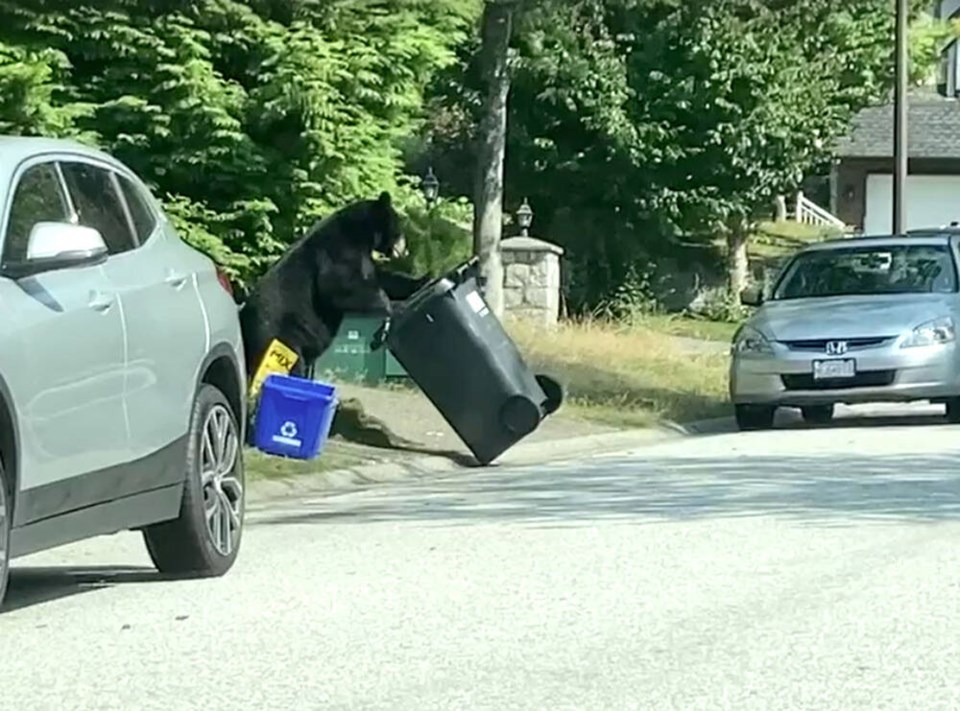The North Shore Black Bear Society is urging residents to clean up their acts as bears get into their busy season.
Bears are currently going through hyperphagia – foraging for up to 20 hours at a time, trying to take in upwards of 20,000 calories per day and pack on body fat for the winter.
Holly Reisner, co-executive director with the society, said volunteers are stepping up their efforts to ensure none of that food is coming from residents’ garbage bins, fruit trees, backyards or garages.
“It really is important for people to realize that we have a responsibility to the bears for keeping them safe,” she said. “We want our bears on the North Shore eating natural foods.”
Black bear showing up in the City of North Van
Notable this year are more reports coming from the Central Lonsdale area in the City of North Vancouver, particularly for one bear that has been showing up as far south as Keith Road along the Ridgeway Avenue corridor.
Reisner said the society believes the bear is a yearling, meaning it is in its first year of providing for itself without a mother. The bear has a tagged ear, which might indicate it was an orphaned cub taken for rehabilitation last year, Reisner added.
Although it might be novel for city dwellers to see a bear moseying around their ‘hood, Reisner said residents around Grand Boulevard and Loutet Park need to step up their efforts to manage attractants around their homes. More than making a mess of the garbage or damaging a homeowner’s property, the stakes are much higher for bears.
“We know that bears can lose their lives for accessing human foods, so we want that bear to move off into the greener areas that we have on the North Shore and find some natural foods,” she said. “And the good news is that we know from research and from experience, that when human-provided foods are removed or made not available, bears do go back to natural food sources.”
The North Shore Black Bear Society urges people to pick tree fruit before it ripens, freeze their organic food waste until collection day, thoroughly wash out containers and packaging before putting them in the garbage or recycling, and to wash out garbage and organics bins with vinegar after collection.
If anyone needs help with clearing their yards of tree fruit, volunteers from North Shore Fruit Tree Project can be assigned to come collect the fruit and then donate it to charities on the North Shore.
Two North Shore black bears killed so far
So far in 2024, two bears have been killed by conservation officers on the North Shore – one after it bit a woman while she was gardening and one after it pushed its way into a home to access a freezer. Bears getting into enclosed spaces in pursuit of food is a “red line” for conservation officers, Reisner said.
Reisner said they have also had many reports about bears that are limping this year – most likely from being struck by drivers. The likelihood of encountering a bear on the roads will only go up in the weeks ahead.
“Really, we’d love it if people could think about wildlife when they’re driving on the North Shore,” she said.
Hyperphagia will continue until the bears can no longer find a steady supply of food, at which time they’re likely to find a den for the winter. If they continue to find food, they may skip denning entirely, which could impact female bears that mated over the summer. Fertilized eggs won’t implant themselves until the mother has put on enough body fat to sustain herself and the cubs through the winter in their den.
“So, the more fat that she puts on during this part of the year, the more babies that she’ll come out of the den with in April,” Reisner said.
Between January to September, District of North Vancouver bylaw officers issued 813 tickets related to bear attractants – the almost all of them (806) for placing solid waste bins on the street outside the permitted times. That carries a $100 fine for a first offence. For a subsequent offence, that fine rises to $500. There were 41 such cases in the first eight months of 2024.
Enforcement is up compared to the same period in 2023, when bylaw officers dinged 554 residents first offences and 31 for subsequent ones, according to the district.




